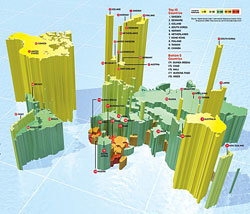 King Gyanendra got his 10 minutes on the international stage here Wednesday but his message was lost as the information age spotlight remained on the fight over who will run the internet and the host government's repression of activists.
King Gyanendra got his 10 minutes on the international stage here Wednesday but his message was lost as the information age spotlight remained on the fight over who will run the internet and the host government's repression of activists. The king's appeal to develop an international system to preside over internet technology, now in the hands of the US-based ICANN, appeared to have been written before Tuesday's late-night deal between government bureaucrats here to attend the World Summit on the Information Society (WSIS). The pact guarantees no immediate changes to internet oversight but did establish a forum that will revisit the numerous proposals for reform.
American officials were ecstatic about the last-minute deal. "We are thrilled with this decision," ambassador David Gross told journalists, saying it "preserved the unique role of the United States."
Added Assistant US Secretary of Commerce MD Gallaher: "The internet lives to innovate another day."
Leading off the afternoon session of speakers, which included Indian Minister for Communications and Information Technology Dayanidhi Maran and Palestinian President Mahmoud Abbas, King Gyanendra made a pitch for further hightech aid for Nepal and other developing, land-locked and mountainous countries.
The king refrained from touching on the increasingly sensitive topic here of freedom of expression, which was met head-on by earlier speakers. "It is, quite frankly, unacceptable for the United Nations to continue to include among its members states which imprison citizens for the sole reason that they have criticised their government on the internet or in the media," said Swiss President Samuel Schmid in his opening speech.
 Ironically, human rights activists and journalists here, both local and foreign, continue to be silenced by police and plainclothes officials, who stand at every corner of this mammoth conference site.
Ironically, human rights activists and journalists here, both local and foreign, continue to be silenced by police and plainclothes officials, who stand at every corner of this mammoth conference site. Freedom of expression advocates have denounced the decision to name Tunisia as host because the government has jailed journalists critical of its policies and actively censors the internet.
The Committee to Protect Journalists (CPJ) slammed the detention of journalists Hamadi Jebali and Mohamed Abbou. In April Abbou was sentenced to three and a half years in prison for writing an Internet article posted on the banned Tunisian internet site, Tunisnews, that compared torture in Tunisia's prisons to conditions in Iraq's infamous Abu Ghraib jail.
Some activists were also critical of the presence of King Gyanendra who shut down ISPs and placed soldiers in newsrooms after his February 1 takeover. "King Gyanendra has shown open contempt for the free press. His attendance at the information summit should be read as a cynical attempt at window dressing," said Tejshree Thapa, South Asia researcher for Human Rights Watch.
Added the president of the Federation of Nepalese Journalists (FNJ) Bishnu Nisthuri: "The WSIS gives the king another opportunity to lie to the world."
But the UN says there is room at the WSIS for world leaders like King Gyanendra. "We would interpret the presence of leading figures from governments as a positive indication of their growing support for this principle," said Sarah Parkes of the International Telecommunications Union which is a co-host of the Summit.


